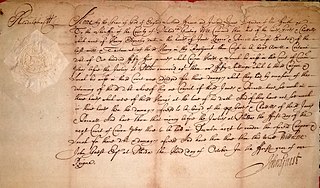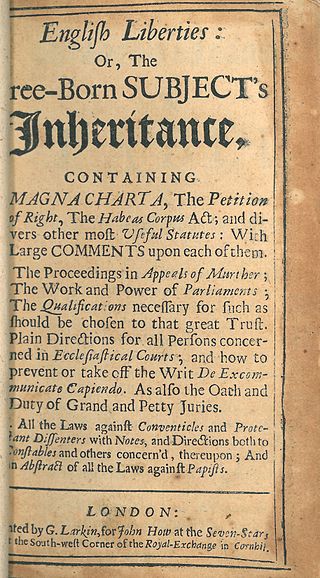Related Research Articles
Habeas corpus is an equitable remedy by which a report can be made to a court alleging the unlawful detention or imprisonment of an individual, and requesting that the court order the individual's custodian to bring the prisoner to court, to determine whether their detention is lawful.

In common law, a writ is a formal written order issued by a body with administrative or judicial jurisdiction; in modern usage, this body is generally a court. Warrants, prerogative writs, subpoenas, and certiorari are common types of writs, but many forms exist and have existed.
In law, ex parte is a Latin term meaning literally "from/out of the party/faction of", thus signifying "on behalf of (name)". An ex parte decision is one decided by a judge without requiring all of the parties to the dispute to be present. In English law and its derivatives, namely Australian, New Zealand, Canadian, South African, Indian, and U.S. legal doctrines, ex parte means a legal proceeding brought by one party in the absence of and without representation of or notification to the other party.
A writ of coram nobis is a legal order allowing a court to correct its original judgment upon discovery of a fundamental error that did not appear in the records of the original judgment's proceedings and that would have prevented the judgment from being pronounced.

The Habeas Corpus Act 1679 is an Act of Parliament in England during the reign of King Charles II. It was passed by what became known as the Habeas Corpus Parliament to define and strengthen the ancient prerogative writ of habeas corpus, which required a court to examine the lawfulness of a prisoner's detention and thus prevent unlawful or arbitrary imprisonment.
Significavit is an obsolete writ in English ecclesiastical law, issued out of chancery, that a man be excommunicated for forty days, and imprisoned until he submits himself to the authority of the church. It is synonymous with the writ de excommunicate capiendo.
De contumace capiendo is a writ issued out of the Court of Chancery for the arrest of a defendant who is in contempt of an ecclesiastical court. It was created when Parliament intervened in 1813 to strip the Church of the power to excommunicate for contempt by writ de excommunicato capiendo.
In United States law, habeas corpus is a recourse challenging the reasons or conditions of a person's confinement under color of law. A petition for habeas corpus is filed with a court that has jurisdiction over the custodian, and if granted, a writ is issued directing the custodian to bring the confined person before the court for examination into those reasons or conditions. The Suspension Clause of the United States Constitution specifically included the English common law procedure in Article One, Section 9, clause 2, which demands that "The privilege of the writ of habeas corpus shall not be suspended, unless when in cases of rebellion or invasion the public safety may require it."
Boumediene v. Bush, 553 U.S. 723 (2008), was a writ of habeas corpus petition made in a civilian court of the United States on behalf of Lakhdar Boumediene, a naturalized citizen of Bosnia and Herzegovina, held in military detention by the United States at the Guantanamo Bay detention camps in Cuba. The case underscored the essential role of habeas corpus as a safeguard against government overreach, ensuring that individuals cannot be detained indefinitely without the opportunity to challenge the legality of their detention. Guantánamo Bay is not formally part of the United States, and under the terms of the 1903 lease between the United States and Cuba, Cuba retained ultimate sovereignty over the territory, while the United States exercises complete jurisdiction and control. The case was consolidated with habeas petition Al Odah v. United States. It challenged the legality of Boumediene's detention at the United States Naval Station military base in Guantanamo Bay, Cuba as well as the constitutionality of the Military Commissions Act of 2006. Oral arguments on the combined cases were heard by the Supreme Court on December 5, 2007.
In United States law, habeas corpus is a recourse challenging the reasons or conditions of a person's detention under color of law. The Guantanamo Bay detention camp is a United States military prison located within Guantanamo Bay Naval Base. A persistent standard of indefinite detention without trial and incidents of torture led the operations of the Guantanamo Bay detention camp to be challenged internationally as an affront to international human rights, and challenged domestically as a violation of the Due Process Clause of the Fifth and Fourteenth amendments of the United States Constitution, including the right of petition for habeas corpus. On 19 February 2002, Guantanamo detainees petitioned in federal court for a writ of habeas corpus to review the legality of their detention.

Henry Care (1646–1688) was an English political writer and journalist, or "Whig propagandist", whose specialty was anti-Catholicism.

James Forbes (c.1629–1712) was a Scottish nonconformist divine.

The Habeas Corpus Suspension Act, 12 Stat. 755 (1863), entitled An Act relating to Habeas Corpus, and regulating Judicial Proceedings in Certain Cases, was an Act of Congress that authorized the president of the United States to suspend the right of habeas corpus in response to the American Civil War and provided for the release of political prisoners. It began in the House of Representatives as an indemnity bill, introduced on December 5, 1862, releasing the president and his subordinates from any liability for having suspended habeas corpus without congressional approval. The Senate amended the House's bill, and the compromise reported out of the conference committee altered it to qualify the indemnity and to suspend habeas corpus on Congress's own authority. Abraham Lincoln signed the bill into law on March 3, 1863, and suspended habeas corpus under the authority it granted him six months later. The suspension was partially lifted with the issuance of Proclamation 148 by Andrew Johnson, and the Act became inoperative with the end of the Civil War. The exceptions to Johnson's Proclamation 148 were the States of Virginia, Kentucky, Tennessee, North Carolina, South Carolina, Georgia, Florida, Alabama, Mississippi, Louisiana, Arkansas, and Texas, the District of Columbia, and the Territories of New Mexico and Arizona.
The Habeas Corpus Act of 1867 is an act of Congress that significantly expanded the jurisdiction of federal courts to issue writs of habeas corpus. Passed February 5, 1867, the Act amended the Judiciary Act of 1789 to grant the courts the power to issue writs of habeas corpus "in all cases where any person may be restrained of their liberty in violation of the constitution, or any treaty or law of the United States." Prior to the Act's passage, prisoners in the custody of one of the states who wished to challenge the legality of their detention could petition for a writ of habeas corpus only in state courts; the federal court system was barred from issuing writs of habeas corpus in their cases. The Act also permitted the court "to go beyond the return" and question the truth of the jailer's stated justification for detaining the petitioning prisoner, whereas prior to the Act courts were technically bound to accept the jailer's word that the prisoner was actually being held for the reason stated. The Act largely restored habeas corpus following its 1863 suspension by Congress, ensuring that anyone arrested after its passage could challenge their detention in the federal courts, but denied habeas relief to anyone who was already in military custody for any military offense or for having aided the Confederacy.

The Writ De Excommunicato Capiendo Act 1562 was an Act of the Parliament of England.

Christopher Ness (1621–1705) was an English ejected minister and theological author. He wrote extensively in an astrological vein, though he rejected the comparison with judicial astrology.

Thomas Knyvett (1596–1658) was an English JP and Royalist during the English Civil War
De homine replegiando is a legal remedy used to liberate a person from unlawful detention on bail, "with a view to try the question of the validity of the law under which he is held in confinement."
Adam White was a Scottish Presbyterian minister imprisoned for non-conformity in Northern Ireland in the 1660s before being pardoned by King Charles II.
References
- ↑ Ballentine, J.A. (1930). A Law Dictionary. Rochester, NY: Lawyers Co-operative Publishing Company. p. 110. ISBN 9785874728069.